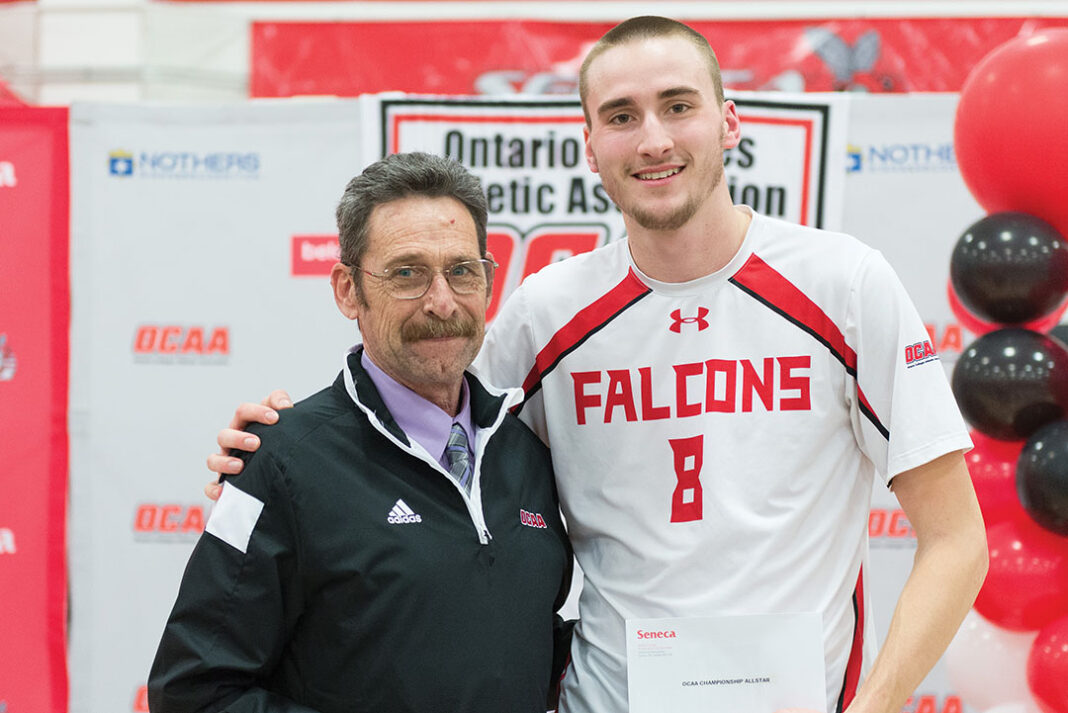
BY: SANZANA SYED
Loyal, passionate, selfless, a gentleman these were just some of the words people used to describe Wayne Fish. People who knew him say he was always putting students first.
Edward Wayne Fish died at the age of 64 on Feb. 8 after an eight year battle with cancer.
Fish loved the OCAA, according to Tom Hipsz, a student-athlete adviser who worked closely with Fish at Sheridan College. He says Fish’s death didn’t really catch the full-time athletics department at Sheridan off guard. Seeing Wayne park his car and come out with his walker, they knew his health was declining as the years went on.
“But we also saw a man so dedicated to Sheridan, and the OCAA and to student athletes,” Hipsz says. “There was nothing he would rather do.”
Although he dedicated his life’s work to the OCAA and the Sheridan Bruins, Hipsz says his number one priority always went to ‘his girls’; Fish’s wife Kathryn and his two daughters Marisa and Ciara.
Since 2003, Fish was the Varsity Coordinator at the Sheridan Athletics and Recreation Department and quickly became part of the Sheridan Bruins family.
In the sporting world, that can often be so competitive, “Wayne was so collegial,” Hipsz says. “He got along with everyone. I never heard him say a bad word about a person or an institution.”
Hipsz says when Fish talked about his younger days, he admitted in the beginning he didn’t take school seriously. It took him time to find the right fit, or the right place for him. When he began his career working with students at Seneca and Sheridan he fit right in.
“With Wayne Fish, it was more like a friendship,” Jeff Wayne a Sheridan College electrical techniques student and rugby manager says. “I felt like I’ve known him for a lot longer than I did, even though it was only two years or so.”
Wayne says anytime he’d email Fish, there would always be a different quote after his response. Wayne admits that he used to save many of Fish’s quotes.
Jim Bialek saved his last correspondence with Fish and shared that email with sweat dated Dec.11 last year. The line written underneath that email quotes Hall of Fame football coach Marv Levy:
“Ability without character always loses”
“Did I know him as well as other people? Probably not,” Bialek says. “Did I know him well? Well, I think I did as a man and a person. Did I feel comfortable enough cutting through everything to say, ‘What’s going on with you?’ Yes, I did. That’s kind of the relationship I think a lot of people had with him.”
Bialek says the email is special to him and that he’ll keep it, as it’s his last communication with Fish. Fish outlines the details of how he felt at the time in a few short, honest words.
Many people who knew him would agree Fish always put others before himself. Even while fighting cancer, he would still ask others how they were doing.
Bialek says Fish had battled cancer before. For over eight years, he fought that battle and came back to work as the Volleyball Convenor up until three weeks before his passing.
“I first met him 26 years ago when I coached at Seneca for a year,” Jim Flack, Sheridan’s Athletic Director told the OCAA. “His outgoing personality never changed, and typical of Wayne, he worked until he could work no more. His body simply gave out.”
He never wanted to be in the spotlight and that’s what many people say about him.
Marcy Skribe, a former women’s basketball and soccer student athlete, knew Fish during his days at Seneca College in 1995. She says Fish was the biggest cheerleader, was amazing at what he did and went above and beyond while he worked there.
“People appreciated him because he appreciated everybody. He definitely left his mark, I think, wherever he went,” she says.
Hipsz agrees Fish’s legacy is to “believe in young people and that no matter where you’re at, take it seriously and finish.” Even if it takes one or two tries, Fish always motivated people to continue to achieve their dreams and goals.
Fish took few photos while with OCAA because he didn’t want to steal the limelight from others. He ensured that the athletes were recognized.
“He loved your publication,” Hipsz concluded about sweat. “If you wanted to write an article about him when he was alive, he would have said, ‘Oh no, there’s so many more important things, important people, you don’t need to write about me.’”

